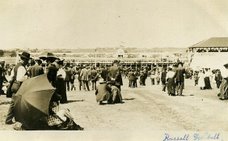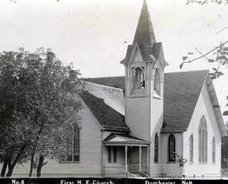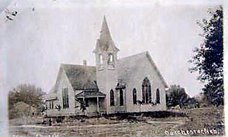 Dorchester has a lot going on right now. But there's still a large number of Dorchester residents who want village leaders to consider a plan to pave Dorchester's streets -- even if it's only a limited paving strategy, including finishing 11th Street.
Dorchester has a lot going on right now. But there's still a large number of Dorchester residents who want village leaders to consider a plan to pave Dorchester's streets -- even if it's only a limited paving strategy, including finishing 11th Street.Critics to street paving have often asked: How do you propose we pay for such an undertaking?
Well, the Times staff are firm believers that with newly paved streets (in certain areas -- not every street) will come new home construction, more home improvements and increased property values -- meaning more city revenue. (Other benefits would be better air quality, less money spent on gravel and labor, a renewal of community pride, and a better quality of life in general.)
The Times decided to explore the methods of revenue collection used by other communities currently paying for new paving projects. We found a variety of approaches. They include:
- IMPACT FEES ON BLIGHTED PROPERTIES: The City of Lincoln, for example, relies heavily upon "impact fees" that are applied to new homes built in the city's outer limits. One member of the Times staff adamantly suggested stiff "impact fees" on condemned or vacant properties (commercial and residential) and properties whose owners won't obey the village's clean-up orders. Not a bad idea.
- FEES ON NEW SEWER/WATER HOOK-UPS: Smaller communities with populations more similar to Dorchester also impose impact fees. Ceresco has a water and sewer development fee of $2,250 per lot. Malcolm has a tap fee for sewer and water of $250 per lot, plus a sewer and water fee of $2,250 per lot. These fees are used, at least in part, for road improvements.
- EARMARK A PERCENTAGE OF CURRENT REVENUES: The Village Board could set aside 5, 10 or 15% of current utility revenues or keno profits, earmarked specifically for paving streets.
- BONDING: Since Dorchester doesn't have a boom in new home building -- not yet, anyway -- the village would likely need to utilize a bonding program. Many communities that take on new paving projects have residents vote on a bond issue, typically paid for by an increase in property tax, which is never too popular but might be acceptable for paving.
- LOCAL OPTION SALES TAX: Dorchester could impose up to a two-cent sales tax on goods sold in the confines of the village, with the revenue being dedicated to paving. Such a tax would need to get voter approval first under the state's LB840 program. This seems like a sensible route.
- GET CREATIVE: There are some more creative and affordable ways of accomplishing the paving mission. Some communities hold special fundraising drives to offset the overall cost. One community even found "sponsors" who donated substantial sums and renamed streets after the largest donors. In Washington state, one small community recently paved all of its streets thanks to a donated labor and machinery from a heavy equipment operation school.
To make paving -- even partial paving a reality -- residents of Dorchester are going to have to start taking their case to village board officials. It's obvious nothing will get done until that happens. (For the next town board meeting date, click here.)


















































first pass an ordinance prohibiting loaded semi trucks from driving on the paved streets we do have ... main street and 9th!
ReplyDeleteThat would be pretty much impossible when the school and bars get deliveries often from semi trucks.
ReplyDeleteIf i were pushing this, and i'm not, as i'm a rural resident who saw the town torn apart. I'd study real hard on what/why failed last time. Because making the same mistakes has doomed the effort so far and will continue. Then answer the question of what/how you will help out the people who ponied up the funds for paving the first time. Until those questions are answered and dealt with, your wants will go for 'NOT'! The last time paving was shoved down peoples throats, it was badly planned with more mistakes then good issues.
ReplyDeleteI agree with that thoughtful comment, but most residents living in Dorchester now weren't even born or were just toddlers the last time paving was "pushed." It's time to do it because the world has moved on (most of those opponents from the 70s are dead or moved away).
DeleteIn order to attract younger families and much needed new residents to help Dorchester's population grow and not deminish as a town, the current state of the Village needs to be improved. Paving the roads is not an easy, quick, or cheap task, but would be a huge benefit to the community over time. Not only with helping the town become a more attractive option to new residents, but more residents means more income coming into the community. This town needs to accept the fact that the current population is becoming a much older (dying) population that will not sustain the community.
DeleteThat spirit isn't Dead. Only the names
ReplyDeletehave changed to protect the innocent.
We want a vote, we want a vote, we want a vote...
ReplyDeleteMy favorite quote is from a Dorchester village board member who in 1979 asked a young couple that had threatened to move if the streets were paved, "Where exactly are you going to move to? Friend? Wilber? Crete? They all have paved streets and they all have assessments." Ha. Sad thing is the young couple moved anyway to Milford and Dorchester still has too many gravel streets. It really is time for modern day residents to all have a say, not just the loudest of the loud.
ReplyDeletewhat are u voting on?
ReplyDeleteThose Golf Carts really kick up a lot of dust!
ReplyDeletenot having paved streets don't bother me at all, we are a village and I really like our village atmosphere. What does bother me tho is that our village employees can't properly take care of the gravel streets we do have. The village has a Motor Grader, can we put the blade down our roads and keep them the proper width and maintained?
ReplyDeleteWhich I have talked to many residents about this and most agree with me. We are tired of mowing the streets and having a cattle trail to drive down.
We have to be able to take care of what we got before we get something "better" and not know how to properly take care it when we can't do it now
Paved streets require no gravel or grading.
Deletetrue, but they still need maintained i.e. pot holes, debris, etc... it's not a "set it and forget" road. if we can't "maintain" our roads now, what makes you think we can when they are paved?
DeleteA paved street will at least be OK for 50 yrs. That's the current age of the street that goes past the school and it has never been resurfaced, good Return on Investment
Deleteand that school street along with the paved street north of the football field have the nicest homes in town outside of main street so that tells you something
Delete